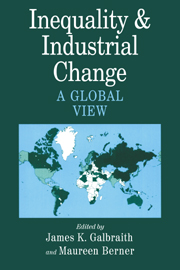Book contents
- Frontmatter
- Contents
- Contributors
- Permissions
- Acknowledgments
- PART I INTRODUCTION TO THEORY AND METHOD
- PART II INEQUALITY, UNEMPLOYMENT, AND INDUSTRIAL CHANGE
- PART III INEQUALITY AND DEVELOPMENT
- 7 Toward a New Kuznets Hypothesis: Theory and Evidence on Growth and Inequality
- 8 Measuring the Evolution of Inequality in the Global Economy
- 9 Economic Regionalization, Inequality, and Financial Crises
- 10 Inequality and State Violence: A Short Report
- 11 Grading the Performance of Latin American Regimes, 1970–1995
- 12 The Evolution of Industrial Earnings Inequality in Mexico and Brazil
- 13 The Legacy of the HCI: An Empirical Analysis of Korean Industrial Policy
- 14 Inequality and Economic Development: Concluding Reflections
- PART IV METHODS AND TECHNIQUES
- Data Appendix
- References and Selected Bibliography
- Index
12 - The Evolution of Industrial Earnings Inequality in Mexico and Brazil
Published online by Cambridge University Press: 05 June 2012
- Frontmatter
- Contents
- Contributors
- Permissions
- Acknowledgments
- PART I INTRODUCTION TO THEORY AND METHOD
- PART II INEQUALITY, UNEMPLOYMENT, AND INDUSTRIAL CHANGE
- PART III INEQUALITY AND DEVELOPMENT
- 7 Toward a New Kuznets Hypothesis: Theory and Evidence on Growth and Inequality
- 8 Measuring the Evolution of Inequality in the Global Economy
- 9 Economic Regionalization, Inequality, and Financial Crises
- 10 Inequality and State Violence: A Short Report
- 11 Grading the Performance of Latin American Regimes, 1970–1995
- 12 The Evolution of Industrial Earnings Inequality in Mexico and Brazil
- 13 The Legacy of the HCI: An Empirical Analysis of Korean Industrial Policy
- 14 Inequality and Economic Development: Concluding Reflections
- PART IV METHODS AND TECHNIQUES
- Data Appendix
- References and Selected Bibliography
- Index
Summary
In this chapter, we use industrial data to derive estimates of the pattern of change in wage inequality in Mexico and Brazil. Using the group decomposition of Theil's T statistic, we present monthly changes in the dispersion of industrial wages for Brazil (1976 through 1995) and for Mexico (1968 through 1998). Both countries show increases in wage dispersion over time, and we find a strong negative correlation with the rate of real economic growth. Other things being equal, the later Brazilian heterodox stabilization plans seem to have reduced inequality in the short run.
Introduction
A great many things have been written about inequality on the basis of evidence that may charitably be described as thin. As the recent work of Deininger and Squire (1996a) makes clear, the measurement of household and personal income inequality for most countries has been sporadic and of uneven quality. Even where these authors judge the data to be of acceptable quality, the number of observations is generally too few to permit useful time-series analysis. Over the quarter century from 1970 to 1995, Deininger and Squire find only fourteen acceptable estimates for Brazil and only five for Mexico.
This chapter presents measurements of change in the dispersion of industrial wages for Brazil from 1976 through 1995 and for Mexico from 1968 through 1998.
- Type
- Chapter
- Information
- Inequality and Industrial ChangeA Global View, pp. 227 - 237Publisher: Cambridge University PressPrint publication year: 2001



